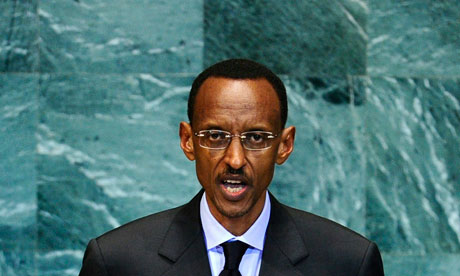|
Joel Mutabazi, an Israeli-trained commando, had fled his own intelligence service after suffering 17 months of solitary confinement and torture and was about to divulge his government's darkest secrets.
But it wasn't Mossad who were after him. Nor was it the KGB or China. The killers, he claims, were from one of Britain's closest African allies. Mr Mutabazi, who served for 20 years as President Paul Kagame's bodyguard, said that the men who came to kill him were, like him, Rwandan. "Kagame has no mercy,'' he told The Times. "He is a killer. He is a dictator. He can't stand any opposition.'' The gunmen shot twice but missed, and ran off into the night.
In a series of interviews in Kampala, Uganda, where Mr Mutabazi is seeking refuge, he described the ruthless regime he left behind _ one totally at odds with a government rewarded for its "vision, drive and delivery'' by the pledge of 90 million ($142m) a year in British aid.
Mr Mutabazi said that Mr Kagame personally oversaw the systematic murder of thousands of Hutu refugees two years after the 1994 genocide that left at least 800,000 people dead. His allegations echoed and amplified a 2010 UN report, which Mr Kagame denied.
Mr Mutabazi said that he escorted Paul Kagame to a secret prison run by Rwanda's Department of Military Intelligence in the outskirts of the capital, Kigali, on at least two occasions in 1996. Twice, he said, Mr Kagame, then Minister of Defence, was called out to inspect lorries carrying containers full of dead bodies that had broken down en route to mass graves.
The US, Sweden and The Netherlands suspended their aid to Rwanda earlier this year over allegations that Kigali is helping rebels behind a slew of human rights abuses in the neighbouring Democratic Republic of Congo. But Andrew Mitchell's last act as British development secretary was to reverse a decision following suit, claiming that Rwanda was trying to resolve the conflict.
"He sings to the West about reconciliation, but it's a lie,'' Mr Mutabazi said of Mr Kagame. "Rwanda hasn't learnt the lessons of the genocide. It's a volcano and it's going to burst and it will be worse than before.''
He accused Mr Kagame of running the country on tribal lines. "All of the soldiers in his bodyguard were Tutsi. If you married a Hutu woman, you were kicked out,'' he said. Innocent Kalisa, a fellow member of Mr Kagame's bodyguard, who also fled to Uganda last year, said that a corporal and two sergeants were fired for that reason between 2006 and 2008.
In Kampala, Mr Kalisa surveyed the cafe where we were due to meet from a nearby hillside, then changed the location at the last moment, fearing assassination. The last reporter to interview Mr Mutabazi, Charles Ingabire, was shot dead leaving a bar in Kampala in November. A few months earlier, Scotland Yard warned two Rwandan exiles living in Britain that "the Rwandan government poses an imminent threat to your life''.
Mr Kalisa, who was also trained by Israeli soldiers, said that he was abducted at gunpoint and forced into an unmarked car as he left a restaurant in Kigali in May. "Their first question was, 'You are a Tutsi, why did you join the Hutu party?''' he said.
He was driven to a secret prison close to Kigali airport, where he was pistol-whipped by an army officer and left in a cell with his left hand cuffed to his right ankle. "I saw blood and hair smeared on the walls and they said, 'We are going to kill you.'''
He used his free hand to unpick the handcuffs with a piece of copper wire, kicked out a window and escaped.
Both of the former bodyguards, interviewed separately, also said that the regime's Republican Guard stuffed hundreds of ballot boxes at their barracks two days before the 2003 elections. Mr Mutabazi said that they worked without sleep for two days: "Finger in ink, finger on Kagame. Finger in ink, finger on Kagame.''
Mr Mutabazi was arrested in April 2010 over allegations that he had supported an exiled Rwandan general, and interrogated three times over 17 months at the army base in Kami. For most of that time his hands were bound behind his back, 24 hours a day, and his feet were shackled. During one interrogation he was hooded and half-suffocated, and water was poured on his head. Later he was given electric shocks. "They told me something I will never forget for the rest of my life. They said: `Your family can't save you. There's no Human Rights Watch, no advocates. We can do what we want.''' He was eventually released into house arrest and fled across the border.
In a report published today, Amnesty International says that it has documented 45 similar cases. It warns that the abuse was only made possible "because perpetrators expected their actions to go unpunished''.
The Justice Minister, Tharcisse Karugarama, admitted that there had been a spate of illegal detentions in 2010 following grenade attacks. "They became overzealous,'' he said of the security forces but added "the state would never condone torture. Not the state I serve.''
The Times

